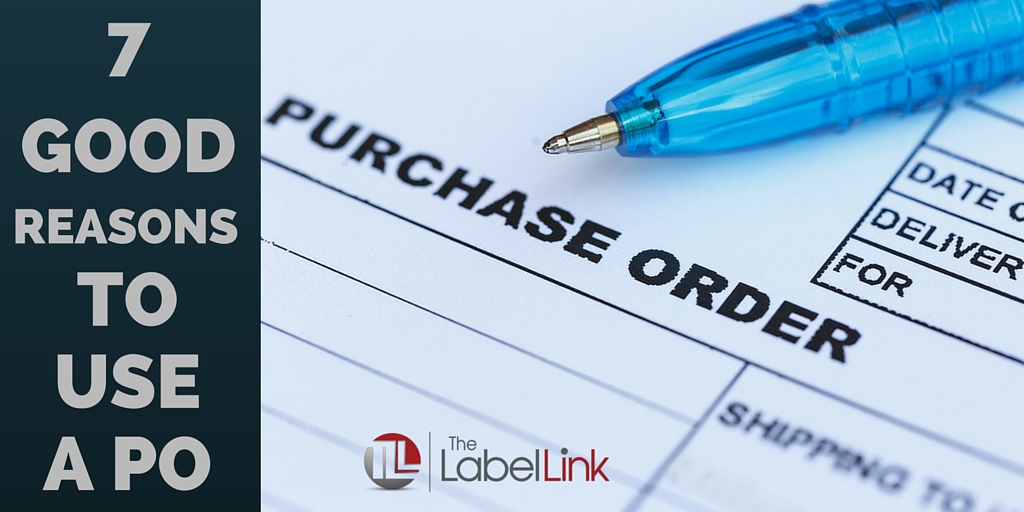
Not Using Purchase Orders? It Might be More Important Than You Think
Consider this: You need a new set of labels for your product. What’s the first step you take? What’s the first step your colleague takes?
Having a strong system for buying labels, or any other product from an outside vendor, is vital. It helps you track your inventory, track your supplies and track your overall business expenses. All this tracking helps you keep a pulse on what’s happening in your business so you can project your growth with accurate reporting.
Purchase orders are especially important for this. Surprisingly, there are many businesses that still don’t use a strong system to track what’s been ordered and received.
If you’re eager to get your company organized, here are seven reasons why using purchase orders is more important than you might think.
#1: See What’s Been Ordered but Not Delivered
What stock do you have coming your way? What’s been ordered from your vendors that you’re still waiting to receive?
The answers to these questions are fast and easy to find if you have a good purchase order system in place.
Some companies wait to input purchase orders until their order arrives. By inputting a purchase order at the same time as you order your supplies, you’ll know what’s on its way so you don’t spend more than you need to.
#2: See Your Financial Commitment Ahead of Time
When you place an order, you’re making a commitment to pay upon delivery. Even though the payment has not been processed through your accounting system, you’re still on the hook for the costs.
By using purchase orders to track what you’ve bought, you will know what type of expenses you can expect. This way, you’re sure to have the funds on hands so there are no surprises down the road.
#3: Your Sales Team Benefits
Your sales team needs to know about your inventory. They need to understand what you have on hand and what’s available for them to sell fast. Don’t put them in a position where they are too scared to promise a customer and potentially lose the sale for you. Instead, let them know when more inventory is coming in so they can feel confident promising their accounts more product.
#4: Save Money
Do you have multiple people keeping an eye on your accounts? If so, you could risk having multiple people place orders for your business. This can double how much you buy and it’s not necessary.
With purchase orders, you can prevent over-purchasing. You can stop overlapping orders with a supplier. If your inventory management system tells you you’re low on supplies but your purchase orders show you’ll receive a shipment tomorrow, everyone in your company will know that you’re in the clear and not to reorder.
#5: See What You’ve Bought at a Glance
Need to estimate how much you’ll spend each quarter? Go back and review your past purchase orders for a glimpse.
History repeats itself – especially in business. To know how much you’ll need in the future, get familiar with how much you’ve bought in the past. Not only will this help you plan for the supplies you need but it can also shed some light on which areas of your business are selling particularly well.
On some occasions, a supplier might be backlogged or might start to slow down their delivery times to you. Looking at past purchase orders can help you see when this is happening so you can either find a new supplier or discuss the situation with your current supplier.
#6: See Your Pricing History
Do your bills seem a little higher than usual? Your suppliers might have snuck in a slight price increase on you without you knowing. This happens more often than you might realize.
With purchase orders on hand, you can track the pricing history you had with a specific supplier. If the price goes up, you’ll know it’s time to revisit your account or start shopping around for a better deal.
#7: See Who Bought the Item in the Past
Change is inevitable – especially in business. People get promoted or leave your company. Or, you swap roles with a partner to cover while he’s on vacation. In either case, you probably won’t consistently have the same person buying for your business time and time again.
On your purchase orders, it’s important to track who made the purchase. Who bought the product for your company? Then, if there is any discrepancy or confusion, you’ll know who to ask about it internally.
Question: Are you using purchase orders in your business?
These are seven excellent reasons why you should use purchase orders in your business. The bottom line is, the more organized you are the better you can track your expenses and your inventory – both are essential for running any product-based business.
